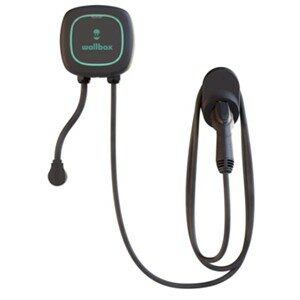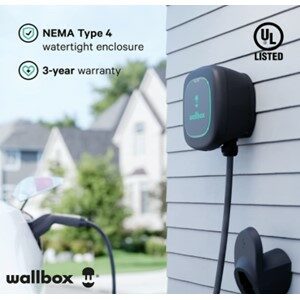EV Car Charging Station – Charging Your EV At Home!

1) Basic Issues with Electric Cars.
2) The Pulsar Plus Level 2 Vehicle Charger.
3) The Pulsar Plus Specifications.
4) Questions About EV Cars.
Quick Info On EV Cars
- Do electric cars charge while driving? No, they do not.
- How long do electric car batteries last? On average about 15 years.
- What happens if the car battery dies? The car will just stop. You will need to be towed.
- What is the average cost to replace an EV car battery? Between $8,000 to $16,000.
Introduction

The EV car charging station is an excellent way to charge your electrical vehicle at home. Now, you have a charger whenever you need it without the worries. The biggest concern in owning an EV vehicle is finding charging stations. Each car has a limit to the number of miles it can travel on one charge.
The Pulsar Plus Level 2 charger puts out adjustable capacity amps from 6 to 40 and is UL Certified so it qualifies for the Alternative Fuel Infrastructure Tax Credit of 30% up to $1000.
It uses the NEMA 14-50 plug, neutral wire, and a type 1 SAE J1772 connector. This charger is compatible for all EV model cars. Some Tesla models require using the Tesla adaptor to work with the Pulsar Plus charger.
This charger emits up to 40A but does require a separate 50-amp line to support it. What is nice about this charger is that it connects with Alexa and Google Home. It uses Wi-Fi and Bluetooth to wirelessly monitor the charging and related statistics. It will provide notifications like off-peak utility rates, create schedules, set reminders and more. They can be connected to your smart devices as well.
The charger can be connected outside or inside the garage. It also puts you in control of the energy usage which lets you to start charging smarter.
Basic Issues With Electric Cars
There are some issues with the EV cars. We will mention just a few of them below.
-

Pulsar Plus Outside Connectivity How much does it cost to replace the battery? $5,500 on average.
- How long do EV car batteries last? On average up to 10 years.
- How long do EV cars last? On average, up to 100,000 miles.
- What happens to EV cars in cold weather? Leaving your EV car outside in the cold weather will take more power to start it. Cold weather drains the battery when left outside. If it takes more power to start it, then, it will leave less power for driving the vehicle. These batteries lose up to 50% of their power when the outside temperature is below -40 degrees F.
- How many miles can EV cars go on a single charge? On average up to 250 miles. Some of the newer models can go up to 350 miles on a single charge.
- Do EV cars require maintenance? Yes, they do. Tires, windshield wipers, and brake fluid changes. They do not require any oil changes since they don’t use any oil in the engine.
- Why do EV cars fail? They are limited by a shortage of charging stations when traveling. High electricity costs. Recharging time takes anywhere from 8 to 24 hours at home. However, at fast charging stations 30 minutes to 1 hour is the average charging time. The battery limits the distance cars can travel between charges.
- Are EV cars cheaper to insure? No. The reason is they have large batteries and are expensive to replace when the car is damaged.
- How much does it cost to charge an electric car per month? Charging your EV vehicle will average between $30 to $60 a month. The EV cars are cheaper to fuel and maintain than the gas-powered models. The EV cars will cost more to buy. Check with your utility company to see if they offer discounts for electric cars.
- How do I know if my lithium-ion battery is bad? When your battery stops charging it is dead. Healthy batteries charge and hold it for a specific period. If it loses the charge immediately, it is bad and needs to be replaced.
- How much does it cost to charge an electric car at a public charging station? According to EIA, the July 2019 national average for commercial electricity is only $0.11 per kWh, but the price rate ranges from $. 08 per kWh in Nevada, which is low, to the highest rate of $0.19 per kWh in California.
- Are charging stations for EV cars free? Many EV owners charge their cars at public charging stations. They can be free, pay-as-you-go or subscription-based, with prices set by networks or the property owners.
- What are the Safest Hybrids and Electrics for 2021? See the list below.
- Tesla Model 3.
- Toyota Highlander Hybrid.
- Ford Explorer Hybrid.
- Lexus NX300h.
- Volvo S60 and V60 Recharge.
- Volvo XC60 Recharge.
- Volvo XC90 Recharge.
- Audi E-Tron and E-Tron Sportback.
Note: When traveling on long distances, be sure to look for public charging stations along the route you will be traveling. By knowing the mileage range of your battery, will help you make it to the next charging station before the battery runs out of power.
The Pulsar Plus Level 2 Electric Vehicle Charger
This is a level 2 charger that will charge faster than level 1 devices. It allows sharing power. This means you connect another Pulsar Plus unit on the same circuit and can charge more than one vehicle at the same time. This feature can come in handy if you own more than one EV car.
It comes from the factory ready to go at 16 amps and you don’t need to connect to the internet for it to work. You don’t need any additional lines for it to operate. However, it will take longer to charge the battery to full charge. The full capacity of this device is 40 amps. If you want a lower or higher amp output, you will have to download the app to make the change.
Works with Alexa and Google Home, Bluetooth and Wi-Fi. This item is UL listed (2020), and MEMA Type 4 rated for watertightness and dust resistance.
Technical Specifications
- Charging Mode: AC Level 2 (rated voltage 240/208V)
- Connector Type: Type 1 (SAE J1772)
- Dimensions:8 x 7.9 x 3.9 inches
- Weight:61 Lbs.
- Manufacture: Wallbox Chargers SL
- Part Number: PUP1-U-1-5-N-002-A
- ASIN: B08H2LYFHX
- Cable Length: 25ft (7.6m)
- Voltage: 240 (AC)
- Power Range: 6A – 40A
- Maximum Power:6 kW (40A)
- Power Input Connection: MEA 14-50 or Hardwired
- Adjustable Current: From 6A to 40A
- Connectivity: Bluetooth & Wi-Fi
- Enclosure Rating: MEMA Type 4 per UL 50E
- EMC Compliance: FCC Part 15 Class B
- Voice Control: Amazon Alexa and Google Assistant
- Charges: All EV Vehicles
- Warranty: 3-Years from Date of Purchase
PROS
- Better for the environment
- Electricity is a renewable source where gasoline is not
- Less maintenance is required
- Quieter than gas-powered models
- Tax credits are available for those who own an EV car
- In some states, there are lanes for EV cars
CONS
- More expensive than gas model cars
- Shorter mileage range than gas-powered cars
- Charging the battery takes time
- Difficulty in finding a charging station when traveling long distances
- Limited model options
- Some charging stations are not free
Questions About EV Cars
- Do EV charging stations make money? Answer: Yes, they are profitable and make money. Some states offer tax incentives or tax credits to build a charging station. You can also charge a fee to help maximize the profits. If you are a business owner, you can increase foot traffic around your place of business.
- How long does it take to recharge an electric car at a charging station? Answer: The time will vary. Charging an electric car can be done at home or at any public charging station. Fully charging a car can be done in just 30 minutes, or it may take as long as half a day.
- How much does it cost to recharge an electric car battery at a charging station? Answer: The cost of charging an electric car at a public charging station depends on several factors. But to ballpark it, the average cost per kWh is between $0.40 and $0.70, and you get around 3 to 4 miles for every kWh. With this in mind, the average EV vehicle could require around $30 to be fully charged.
- Do electric cars charge while driving? Answer: No, they do not charge while driving.
- How long to electric car batteries last? Answer: Most EV car batteries have a life expectancy between 15 to 20 years.
- What happens when the car battery dies? Answer: If you are on the road, the car will stop running. You will need towing assistance to get to the nearest charging station or dealership.
- What is the average cost to replace an EV car battery? Answer: You can expect to pay anywhere from $10,000 to $16,000 for the battery and labor.
- Can you plug an electric car into a regular outlet? Answer: Electric cars come standard with a 120-volt Level 1 portable charger. Yes, these chargers can be plugged into a simple household outlet, and don’t require any special installation.
Conclusion

EV vehicles are becoming the new thing of the future and governments will probably make them mandatory. We shared some of the costs of owning an EV car as well as the disadvantages. The main reasons for a limited number of these vehicles on the road now is the cost of buying one, cost of insurance, the limited mileage per charge and finding a charging station when traveling. It requires EV owners to have a charging kit at home to charge their vehicles. Otherwise, to be going to a local recharging station on a regular basis.
You should know the mileage range of the battery so you can make it to the next charging station before you run out of power.
This product is made and manufactured in Spain and is the top selling EV charger overseas. This product was introduced in the United States in 2020.
Yes, these cars are great for environment, but you need to charge the EV battery on a regular basis. Remember, these cars do take additional power to run the AC and heater. During the cold winter days, the battery will drain more just by sitting in the cold. It will also take more power to start up the car on cold days. The battery loses 50% of its power when temperature is -40 degrees F or lower.
We shared the electrical costs for the homeowner and the costs recharging the battery at public charging stations. Some of these are free. As more and more EV cars come on the road, expect to pay for recharging your EV battery while on the road.
The bottom line here is you must decide if owning an EV car is for you. Remember, don’t forget about the seasons of the year. If you should live in colder climates an EV car may not be for you.
Shop Pulsar Plus EV Charger
Shop the Pulsar Plus EV Charger by clicking on the image. You will be taken to Amazon where you can place the order.
As an Amazon associate, I earn from qualified purchases.
Go back to the Pros Cons Shopping home page.
Go back to the Pros Cons Shopping home page.
